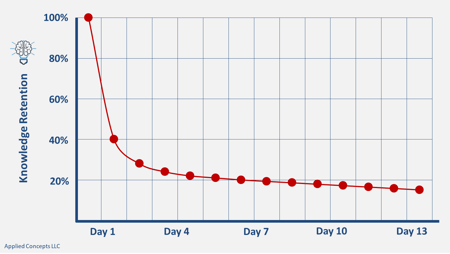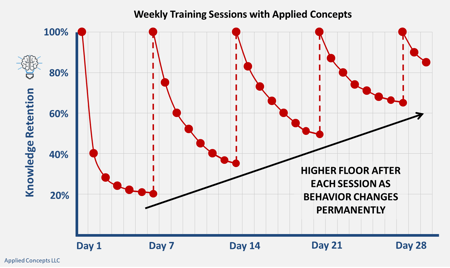Think back to when you were a student. Everyone knows that cramming for an exam isn’t the best approach to retain information and actually perform well. Yet we’ve all taken the route of last minute marathon study sessions at some point in our lives. You may have even successfully remembered enough subject material to do well that big mid-term; but beyond that? You can literally forget about it.
When looking to remember information for the long haul, you’re going to have to use another strategy. Research has found that spaced repetition, as opposed to massed repetition (cramming), is a much more effective way for the brain to commit knowledge to long-term memory.
That is why Applied Concepts leans on this approach for the foundation of its training programs.
WHAT IS SPACED REPETITION?
Spaced repetition is a learning method where the learner revisits their study material at regular intervals over time. Applied Concept’s programs are based on this learning method. Enrollees practice skills and concepts at weekly intervals in role plays that mirror common, real-life customer scenarios. Each week, core concepts are instilled, and role plays become a little more challenging. The end-result is long-term, permanent behavior change for adult learners.
A training program that relies on 2-3 day seminars, eLearnings and other similar approaches can be effective at providing energy boosts to your team and communicating best practices. However, research indicates that they are less likely to result in long-term, permanent behavior change. That is why Applied Concepts embraces the Spaced Repetition Training approach.
THE FORGETTING CURVE

If you wait too long between study intervals, you’ll forget enough material to warrant starting over from scratch. This is called the forgetting curve.
We’ve all heard the saying, “If you don’t use it, you lose it.” What most people don’t realize is just how quickly that happens. When illustrated, the drastic drop of the forgetting curve shows the amount of information lost over a surprisingly short amount of time. It is now known that people will typically forget around 80% of what they’ve learned within a week if it isn’t revisited.
In the late 1880s, Hermann Ebbinghaus conducted studies on himself to record the decline of memory retention over time when there was no effort to revisit the information after being learned. What Ebbinghaus found is that, on average, he would forget around 90% of the information he learned within a month. However, Ebbinghaus’ rate of knowledge retention significantly improved if he revisited the material every few days. As it turns out, every time information or training is reinforced, the length of retention increases.
NERD BLURB
HOW DOES IT WORK?

The key to long-term retention and permanent behavior change, especially in adults, is in the spacing of the learned material. The brain stores information that it deems important, and information that comes up regularly is seen as important. At each interval, the brain is forced to make an effort to retrieve the subject material, thereby strengthening the neural pathway to that information. This is what creates long-term memory retention.
Aside from increased long-term retention, another benefit of spaced repetition is the fact that you don’t need to spend a lot of time reviewing your material at each interval. Studies have shown that spending even a few minutes quizzing yourself on your material can reset the forgetting curve. .
At each point where the subject is revisited, the memory of the learner is “boosted” back up to 100%, thereby resetting the curve.
HOW CAN WE HELP?
Applied Concepts has used spaced repetition as it’s cornerstone method of learning for over 35 years. The long-term commitment of many of our clients is a testament to the effectiveness of Applied Concepts' Spaced Repetition Training — the consistent drip-feeding of skills, feedback, and best practices week after week in small but high-impact doses.
Contact us at info@appliedconcepts.com for a consultation.

